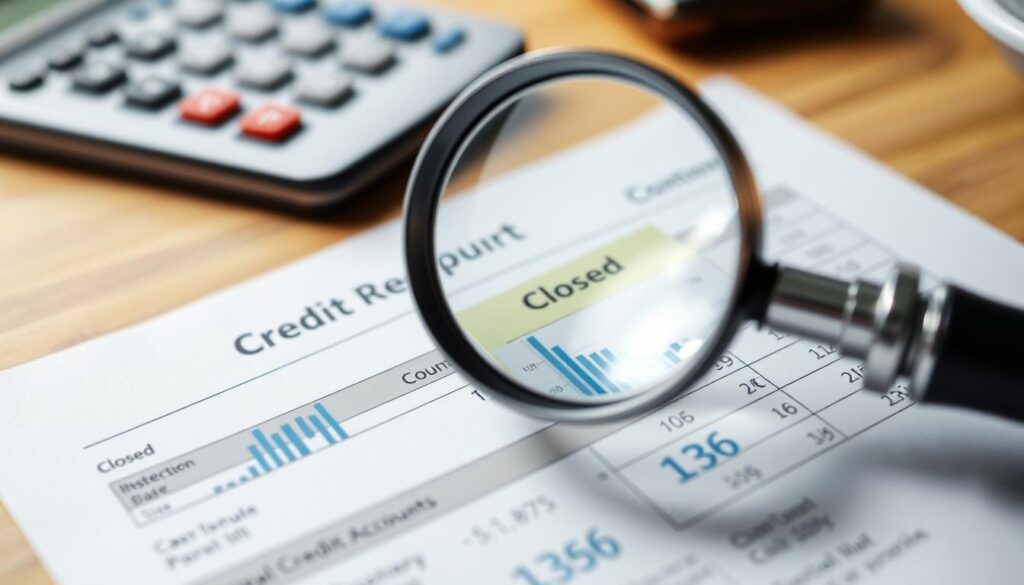Closed accounts on your credit report can harm your credit score and financial health. These entries can affect your creditworthiness long after closure. Luckily, you can take action to remove them and boost your credit profile.
This guide will show you how to identify, dispute, and negotiate the removal of closed accounts. You’ll learn effective strategies to improve your credit report and financial standing.
Key Takeaways
- Understand the impact of closed accounts on your credit score and how to address them
- Learn how to identify closed accounts on your credit report and obtain your free annual reports
- Discover the steps to dispute inaccurate or outdated closed accounts with the credit bureaus
- Explore strategies for negotiating with creditors to remove closed accounts from your credit report
- Gain insights on the Fair Credit Reporting Act (FCRA) and how it can help you remove closed accounts
Understanding the Impact of Closed Accounts on Credit Scores
Closed accounts can still affect your credit score, even after they’re no longer active. It’s important to know why they stay on your credit report. Understanding their potential negative effects helps maintain a healthy financial profile.
Why Closed Accounts Remain on Credit Reports
Closed accounts typically stay on your credit report for up to 10 years. Credit reporting agencies must keep a full record of your credit history. This includes both open and closed accounts.
The Fair Credit Reporting Act (FCRA) determines how long closed accounts remain on your report. This law ensures accurate and fair credit reporting for consumers.
The Potential Negative Effects of Closed Accounts
Closed accounts can still affect your old closed accounts credit score in several ways:
- Reduced credit utilization ratio: Closed accounts lower your total available credit. This can increase your credit utilization ratio and hurt your score.
- Shorter credit history: Closed accounts can shorten your overall credit history. Credit history length is a key factor in determining your score.
- Missed payments: Late or missed payments on closed accounts stay on your closed credit card accounts credit report. These continue to impact your score.
- Unpaid balances: Outstanding balances on closed accounts appear on your closed bank account credit report. These unpaid amounts can harm your score.
Knowing how closed accounts affect your credit profile is crucial. This knowledge helps you take steps to address and reduce potential issues.
Identifying Closed Accounts on Your Credit Report
Spotting closed accounts on your credit report is crucial for your financial health. It helps you understand your money history and keeps your credit info correct. Check reports from Experian, Equifax, and TransUnion for closed account credit reporting issues.
Look closely at the “Closed Accounts” or “Derogatory Information” sections. These list inactive accounts. Check account numbers, creditor names, and closing dates.
- Carefully examine the status of each closed account, noting whether it is listed as “Closed” or “Charged Off.”
- Identify any closed account errors credit report that may be inaccurately reported, such as accounts that should have been removed or incorrectly marked as closed.
- Ensure that the reported closure date aligns with your records and understanding of when the account was actually closed.
By reviewing closed accounts, you can work on disputing closed accounts credit bureaus. This helps in fixing closed account errors credit report. Your credit history should show your true financial responsibility.

| Account | Status | Closed Date | Creditor |
|---|---|---|---|
| Credit Card A | Closed | 05/2020 | Bank XYZ |
| Personal Loan B | Charged Off | 11/2018 | Finance Co. |
| Retail Card C | Closed | 02/2021 | Retail Inc. |
Checking your credit reports for closed account credit reporting issues is important. It allows you to dispute errors with credit bureaus. This keeps your credit history accurate and sets you up for success.
Requesting a Credit Report from All Three Major Credit Bureaus
Monitoring your credit report is vital for managing your credit profile. It’s crucial to request reports from Experian, Equifax, and TransUnion. This gives you a full view of your credit history.
How to Obtain Your Free Annual Credit Reports
You can get a free credit report from each bureau once a year. This is thanks to the Fair Credit Reporting Act. Visit AnnualCreditReport.com to request your free reports.
Reviewing Your Credit Reports for Closed Accounts
- Carefully examine each of your credit reports to identify any closed accounts that may still be listed.
- Look for accounts that you have closed, as well as accounts that have been closed by the lender due to inactivity or other reasons.
- Pay close attention to the status of these accounts, as closed accounts can still negatively impact your credit score if they are not properly reported as closed.
By reviewing your free credit reports, you can spot closed accounts. This is the first step to removing closed accounts from your credit report. It can help improve your overall credit profile.
Monitoring your credit report is essential for maintaining a healthy credit score and ensuring the accuracy of your credit history.
Disputing Inaccurate or Outdated Closed Accounts
Found inaccurate or outdated closed accounts on your credit report? Take action now. Disputing these errors can boost your credit score. It ensures your report accurately shows your credit history.
Preparing a Dispute Letter for Credit Bureaus
Start by writing a clear letter to the credit bureaus. Explain the issue and provide supporting documents. Ask for the removal of inaccurate or outdated information from your credit report.
- Gather relevant documents, such as account closure statements or creditor communications.
- Clearly identify the inaccurate or outdated information, including the account number and the reason for the dispute.
- State the specific actions you’d like the credit bureau to take, such as removing the closed account from your credit report.
- Include copies of your supporting documents, but retain the originals for your records.
Submitting Your Dispute to the Credit Bureaus
Ready to submit your dispute letter? You can do this by mail, online, or phone. Choose the method that works best for you.
- By mail: Send your dispute letter and supporting documents to the credit bureau’s dispute address.
- Online: Many credit bureaus offer online dispute portals, which can be a convenient option.
- By phone: Some credit bureaus allow you to initiate a dispute over the phone, but be sure to follow up in writing.
Keep a record of your dispute for future reference. Note the submission date and any reference numbers provided. This information may be useful later.

Negotiating with Creditors for Account Removal
Removing closed accounts from your credit report doesn’t always require disputing with credit bureaus. Sometimes, you can negotiate directly with creditors to remove accounts, even if the information is accurate.
Effective communication is crucial when negotiating with creditors. Here are some strategies to consider:
- Gather Relevant Documentation: Collect documents related to the closed account. These can include statements, payment histories, and creditor correspondence. Use this information to support your case.
- Be Polite and Persistent: Approach the creditor calmly and professionally. Explain your situation and why removing the account matters. Keep trying, as it may take multiple attempts.
- Offer a Settlement or Compromise: The creditor might remove the account for a partial payment. Negotiate terms that benefit both parties.
- Leverage Goodwill and Hardship: Emphasize any extenuating circumstances like financial hardship. Appeal to the creditor’s sense of goodwill.
- Request a Letter of Deletion: If the creditor agrees, ask for written confirmation. This ensures the account is properly removed from your credit report.
Negotiating with creditors can be time-consuming and complex. However, it’s worth considering to remove closed credit lines and improve your credit standing.
This process can significantly help with credit repair closed accounts. Stay focused on your goal of improving your credit report.
“Persistence and effective communication are key when negotiating with creditors for account removal.”
How to Remove Closed Accounts From Credit Report
Understanding the Fair Credit Reporting Act (FCRA)
The Fair Credit Reporting Act (FCRA) safeguards consumers’ rights in credit reporting. It sets rules for how credit bureaus and creditors handle your credit information. Knowing the FCRA can help you remove closed accounts from your credit report.
Step-by-Step Guide for Account Removal
Removing closed accounts from your credit report is often simple. Follow these steps to get started:
- Obtain a copy of your credit report from all three major credit bureaus: Experian, Equifax, and TransUnion.
- Review your credit reports carefully to identify any closed accounts that are still being reported.
- Prepare a dispute letter for each credit bureau, explaining why the closed account should be removed. Be sure to include any supporting documentation.
- Submit your dispute letter to the credit bureaus, either by mail or online.
- Monitor your credit report for updates and follow up with the credit bureaus if necessary.
Credit bureaus must investigate and respond to your dispute within 30 days. If they can’t verify the information, they must remove the closed account.

Following this guide can help you remove closed accounts from your credit report. This can improve your overall credit profile. Stay alert and seek help if you face any challenges.
The Waiting Game: How Long Does It Take for Closed Accounts to Drop Off?
Understanding the timeline for closed accounts on your credit report is vital. Closed accounts don’t stay on your credit history forever. The duration these accounts remain can vary based on several factors.
The Fair Credit Reporting Act (FCRA) allows negative information to be reported for up to seven years. This applies to closed accounts from the date they were closed.
Several key factors can influence this timeline:
- The type of account: Closed credit card accounts typically remain on your report for longer than closed utility or retail accounts.
- The status of the account: Accounts that were closed in good standing may drop off sooner than those with delinquencies or charge-offs.
- Your personal credit history: Accounts with a longer history on your report may take longer to fall off compared to newer accounts.
The impact of closed accounts on your old closed accounts credit score lessens over time. As you build new, positive credit history, older closed accounts become less influential.
“Patience and perseverance have a magical effect before which difficulties disappear and obstacles vanish.” – John Quincy Adams
Knowing these factors helps you manage your credit strategically. You can ensure closed accounts don’t hinder your long-term financial goals.
Maintaining Good Credit Habits After Account Removal
Great job removing closed accounts from your credit report! But your credit journey isn’t over yet. Let’s explore some effective strategies to keep your credit score healthy.
Strategies for Building and Maintaining a Healthy Credit Score
After removing closed accounts, focus on these key habits:
- Pay all your bills on time, every time. Payment history is the most significant factor in your credit score.
- Keep your credit card balances low. Aim to use less than 30% of your available credit limit.
- Diversify your credit mix by having different types of accounts, such as credit cards, loans, and mortgages.
- Monitor your credit report regularly to ensure accuracy and identify any credit repair closed accounts issues.
- Limit hard credit inquiries by only applying for credit when necessary.
Consistent practice of these habits will improve your credit score over time. Your efforts will pay off in the long run.

“The key to maintaining a good credit score is to develop and stick to healthy financial habits. Consistency is the name of the game.”
Your credit score reflects your financial responsibility. Stay vigilant and enjoy the benefits of a strong how to remove closed accounts from credit report.
Professional Credit Repair Services: Weighing the Pros and Cons
Removing closed accounts from your credit report can be challenging. Professional credit repair services offer help, but it’s important to understand their benefits and drawbacks. Let’s explore the pros and cons of these services.
Credit repair companies have expertise in disputing inaccurate information on credit reports. They handle communication with credit bureaus and creditors for you. This can speed up the removal of closed accounts, especially if you lack time or knowledge.
However, these services come with a cost. Monthly fees can add up quickly. Success isn’t guaranteed, as credit bureaus and creditors make the final decision. It’s crucial to consider these factors carefully.
Some companies may make exaggerated claims or use questionable tactics. This could harm your credit score in the long run. Thorough research is essential before choosing a credit repair provider.
Your decision depends on your situation, finances, and comfort with the dispute process. Consider all options and align your choice with your personal and financial goals.
| Pros of Professional Credit Repair Services | Cons of Professional Credit Repair Services |
|---|---|
|
|
Evaluate the pros and cons carefully. This will help you decide if professional credit repair services are right for addressing closed accounts on your credit report.
Common Misconceptions About Removing Closed Accounts
Closed accounts don’t vanish from credit reports automatically. They can stay for up to 10 years. This can affect your credit score during that time.
Disputing closed accounts isn’t always easy. The Fair Credit Reporting Act allows challenging inaccurate info. But credit bureaus don’t have to remove correct information, even from closed accounts.
Removing a closed account might not boost your credit score. Your overall credit history matters more. Payment patterns and credit use are key factors too.
Improving your credit takes more than just removing closed accounts. Focus on your entire credit profile for better results. Address all aspects of your credit to see real improvement.

